Kid Nation
by John Walker on Sep.21, 2007, under The Rest
While they may be slow to admit it, there’s no sociologist in the world who isn’t delighted to find out about a human being having been kept in the most peculiar or traumatic conditions for many years. Not delighted for that person, of course. But here’s an opportunity to study human beings in a way our societal moral codes would prevent. So you’ll hear stories about the girl who was kept in a chicken coop all her childhood and despair at her plight. But we learn an awful lot from her. On a cold, scientific level, if only we could put a thousand children into chicken coops and have them grow up there. But, you know, that would be abhorrent.
Which makes Kid Nation all the more surprising. Whatever you’ve heard about it, it’s not as disturbing as the reality of watching an episode.
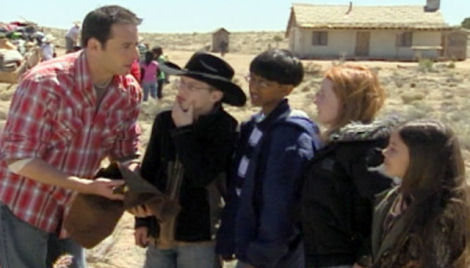
Good luck kids!
The concept is this: Forty children from the age of 8 to 15 are bused to an abandoned mining town in Mexico, and left there, on their own, for a month.
Just left as that alone, it’s already bordering on a chicken coop experiment. It’s a shocking sentence to read, let alone to think it’s actually been filmed, and is now airing. And because of that: fantastic. What an incredible opportunity for sociological study!
Of course, the whole concept is immediately broken by being filmed, and thus being a town full of adult cameramen, boom mic operators, directors, etc. Then it’s further broken by being hundreds of hours of events edited down to 13 hour-long episodes. So, well, it’s probably scientifically useless already. But hey, this is television, so this already ludicrous concept isn’t enough. Let’s mess with those kids’ heads.
Click on
First of all the group are driven on a crappy old school bus to this empty, broken town in the middle of nowhere. And then they’re told that some “leaders” will join them, who arrive by helicopter. They are four more kids from 10 to 15, who the group are told are instilled with leadership qualities. Taken aside, these four kids are given a literal gold star – worth $20,000 – that they are told they will give to the kid they think deserves it the most. But they have to keep it a secret.
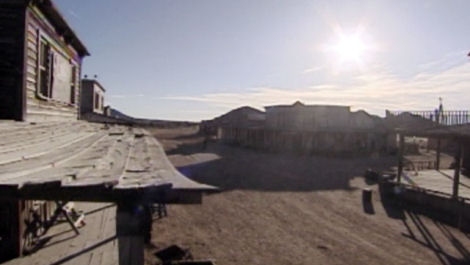
The attractive town
Not enough yet? Then the kids discover they need to split themselves into four “districts”, representing each area of town. The leader kids assign the groups sensibly and privately, keeping friends together, and announce the groups to the others. Something that seems far too organised and convenient for the rest of the show’s plan to have occured without adult intervention. The factions had the effect you’d imagine immediately, turning kids on each other, with the two older boys being in the Blue district going around using chalk to tag the entire town with “BLUE” that night.
More? The production then intervenes the following day by having the adult host arrive, and get the four districts to directly compete in a competition. And the prizes? Astonishingly, the positions taken dictate the position that group will take in an enforced Capitalist system. This begins at the bottom with “labourers”, whose jobs will include hauling water and cleaning latrenes. They will be paid 10c a day. Then there are the cooks, who will get 25c. Next the merchants, manning the various stores in the town, getting 50c, and finally… Finally the “Upper Class” who will receive $1 a day, with no assigned chores, and asked to “pitch in where they’re required.” And who gets what? Well, “it’s going to be decided fairly”, the host tells them, by making them take part in a series of physical competitions. Bemused?
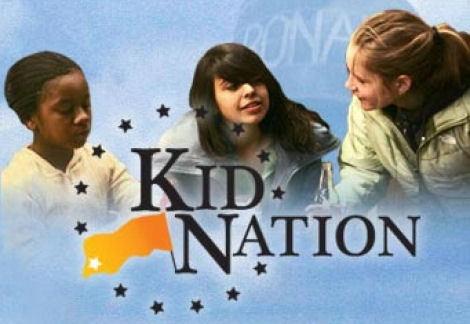
The horrid looking promo pic
So yes indeed, like all proud Americans would surely wish, the strongest team got to be the richest kids, and the weakest team are the barely paid underclass. Rather than leaving stores, goods, and the possibility of letting the kids choose their own system for distribution, Capitalism, in all its unfair extremes, is thrust upon them. Presumably each episode will feature a challenge that will redistribute the tasks – or indeed emphasise how inherently unfair irrelevant competitions are when deciding the financial structure of a town.
The first night, before the district divides, there was a meeting of all the kids, which breaks down exactly as you’d imagine. A fight breaks out between a smart kid, and an older, deeply unpleasant teenager. This led to screaming and disarray, until one boy shouted for quiet, got up in front of the crowd, and gave a wonderful speech to unite the group and have them work together. It gave the impression that while a Lord of the Flies (is any write-up of this show not going to mention that book?) collapse was inevitable, at least they would have gone down trying. But the constant interruptions from adults break anything of interest that might have arisen. They only stop short of having the kids vote each other out of the town.
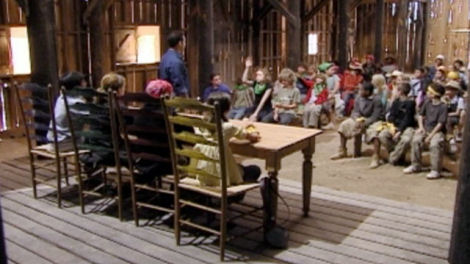
Town council
The gold star concept, aside from being enormously patronising by name, worked brilliantly in the first episode. One girl, Sophia, stood out from the start. Obviously it’s hard to know the reality of anything happening thanks to three days being edited to less than an hour, but she worked hard and kept order, while maintaining an aloof, chilled out attitude. Having done youthwork for many years, I’m very aware how it’s not correct to have favourites, and she would have certainly been the favourite I wasn’t supposed to have. At the first town council meeting, where kids can decide they want to leave, and have debate with their council leaders, the first gold star was awarded. And despite Sophia’s having stood up as the only person to have a problem with the council (making a fair and sensible comment), the four of them gave it to her. It was quite remarkable, and for the first time in the hour, drawing you in rather than having you stare in astonishment. They made a reasoned and intelligent decision in the face of conflict. Sophia thanked everyone, and even apologised for being too bossy. She was then told that it was worth $20,000. There was must gasping and excitement, and she was given a key to a room with a phone so she could tell her parents. (Which presumably she wasn’t able to use until hours later, since they had a film crew in her mother’s house when she received the… surprise phonecall.)
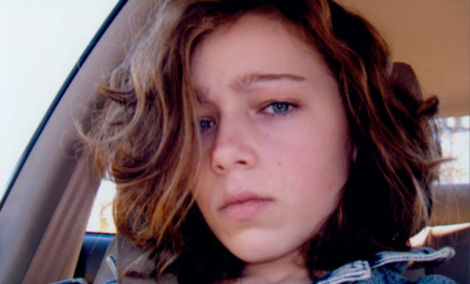
Heroic Sophia
But then, of course, it’s broken now. The kids are told there will be a star awarded every town council, and every one will be worth $20,000. So now no one is going to behave naturally, all attempting to receive an amount of money far too large for the majority of them to understand. Revealing the worth at the end of the project would have kept perhaps the last scrap of usefulness from the experience.
However, another impressive moment occurred when the group were given the choice between seven more outhouses (currently the forty of them had only one), or a television, and not only did the council chose the toilets, but the rest of the group enthusiastically supported the decision. They chose practicality over entertainment.
CBS were clearly terrified of their own project. As were the advertisers, with barely anyone beyond movie companies willing to put a commercial in the show. They even held off having a break until an amazing 39 minutes in, and ran the episode to nearly 55 minutes in order to keep advertising to a minimum. If it turns out to be the spectacular car crash people are expecting, every advertiser will wipe their brows in relief to not be attached. If it gets good ratings and write-ups, then they’ll be scrambling for a slot.
It’s perhaps inevitable that Kid Nation would follow the tried and tested format of one of CBS’s other big reality shows, Survivor, having a challenge per episode, competitive structure, defined teams, and financial rewards. However, if someone were going to carry out an project as morally abysmal as this having eight year olds live in the desert with no adults for 36 days, if only it had been the BBC, or perhaps even Discovery, who might have (while necessarily interfering) left it as the bewildering concept experiment it could have been. Rather than the game show it is.
“Congratulations! You’ve spent three years in the chicken coop – now, would you like to gamble what you’ve already won for another year?”
(Pictures stolen without permission from cbs.com)
7 Comments for this entry
1 Trackback or Pingback for this entry
-
Online Travel Guide
October 29th, 2007 on 18:30Online Travel Guide…
I couldn’t understand some parts of this article, but it sounds interesting…
September 22nd, 2007 on 01:36
As quite possibly “inhumane” to any far too P.C. people reading this: Yes. I agree, it sounds like a fantastic social experiment.
September 22nd, 2007 on 19:36
Except it’s not, as botherer said?
It’s a game show, not a social experiment.
September 22nd, 2007 on 20:18
Disgusting. This isn’t a scientific experiment by a long shot. This is sheer entertainment. I’ll say that again: this is meant to entertain YOU. What a wondefully exploitative concept. Let’s manipulate these kids and dramatise the whole thing for the audience of sadistic dimwits that will enjoy this, perhaps believing that they ‘got’ something from it. I despise you, you inhumane monster.
Welcome to the dehumanisation game. You make me sick.
September 22nd, 2007 on 21:01
I’d recommend watching it, Fred, before deciding what can be ‘got’ from it.
I’ll assume your commendable vitriol was aimed at the producers rather than me.
September 23rd, 2007 on 15:38
Perhaps, but then, I’m not going to eat horse poop just to see how many vitamins I can extract from it. I’d rather reserve my disgust for something other than unreality TV.
No, it wasn’t aimed at you. Spleen venting should be saved, no matter how ineffectual, for those who deserve it. You’re alright in my book.
September 24th, 2007 on 07:58
do you think a plot proposal for South Park ended up in the wrong department?
September 24th, 2007 on 08:00
don’t overdo it …toying with the concept of caustic vitriol ….hmmm?….